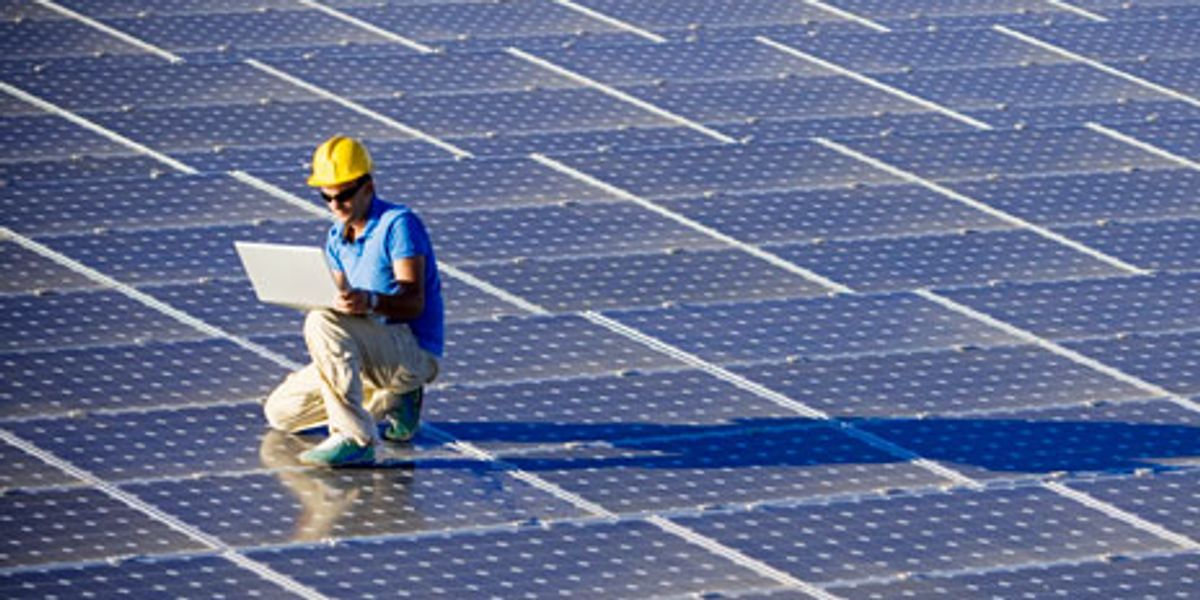IEEE Spectrum....
Today, Oct. 19, seven U.S. makers of PV panels filed a complaint with the government against China, asserting that its manufacturers have been selling their product in the United States for less than half its manufacturing cost. They are demanding that the U.S. government impose tariffs on Chinese photovoltaic imports of at least 100 percent. Under U.S. trade rules, the Commerce Department is required to respond.
The complaint is long overdue. Though its effect if successful--which is far from assured--would be to drive up solar prices in the United States, Chinese PV manufacturers have been dipping doubly, collecting generous subsidies both from their own government and from the countries where they sell their product.
According to a fine analytic report in today's New York Times, China accounts for three quarters of world PV production and exports 95 percent of it, much of it to the United States. Its low-cost exports have driven the cost of installing PV capacity to as low as $1.20 per Watt, according to the Times, contributing to the recent failure of three U.S. companies, layoffs and cutbacks at others, and difficulties for all makers of closely competing green technology.
The complaint filed today was led by Solar World Industries America, the U.S. subsidiary of a leading German PV manufacturer. (The homepage of Germany's Solar World has Larry Hagman, of "Dallas" fame, inviting his German fans to uncouple from the grid by becoming self-producers of energy.) China's aggressive entry into the world solar market has probably caused even more distress in Germany than in the United States: The Federal Republic's solar subsidies have been especially generous, and initially, its companies were leading the way in photovoltaics.
The reason it will be difficult for the solar seven to have success with their complaint is that the United States, like a great many other industrial countries, also subsidizes solar manufacturing. Though its subsidies are less numerous and comprehensive than China's, and though China has not always reciprocated by paying out subsidies to foreign manufacturers exporting green technology to the People's Republic, the ubiquity of subsidies makes such complaints a legal quagmire.
>
The complaint is long overdue. Though its effect if successful--which is far from assured--would be to drive up solar prices in the United States, Chinese PV manufacturers have been dipping doubly, collecting generous subsidies both from their own government and from the countries where they sell their product.
According to a fine analytic report in today's New York Times, China accounts for three quarters of world PV production and exports 95 percent of it, much of it to the United States. Its low-cost exports have driven the cost of installing PV capacity to as low as $1.20 per Watt, according to the Times, contributing to the recent failure of three U.S. companies, layoffs and cutbacks at others, and difficulties for all makers of closely competing green technology.
The complaint filed today was led by Solar World Industries America, the U.S. subsidiary of a leading German PV manufacturer. (The homepage of Germany's Solar World has Larry Hagman, of "Dallas" fame, inviting his German fans to uncouple from the grid by becoming self-producers of energy.) China's aggressive entry into the world solar market has probably caused even more distress in Germany than in the United States: The Federal Republic's solar subsidies have been especially generous, and initially, its companies were leading the way in photovoltaics.
The reason it will be difficult for the solar seven to have success with their complaint is that the United States, like a great many other industrial countries, also subsidizes solar manufacturing. Though its subsidies are less numerous and comprehensive than China's, and though China has not always reciprocated by paying out subsidies to foreign manufacturers exporting green technology to the People's Republic, the ubiquity of subsidies makes such complaints a legal quagmire.
>

 Fractal Design Arc Mini R2, 3800X, Asus B450M-PRO mATX, 2x8GB B-die@3800C16, AMD Vega64, Seasonic 850W Gold, Black Ice Nemesis/Laing DDC/EKWB 240 Loop (VRM>CPU>GPU), Noctua Fans.
Fractal Design Arc Mini R2, 3800X, Asus B450M-PRO mATX, 2x8GB B-die@3800C16, AMD Vega64, Seasonic 850W Gold, Black Ice Nemesis/Laing DDC/EKWB 240 Loop (VRM>CPU>GPU), Noctua Fans.
Comment